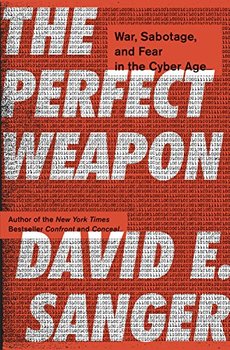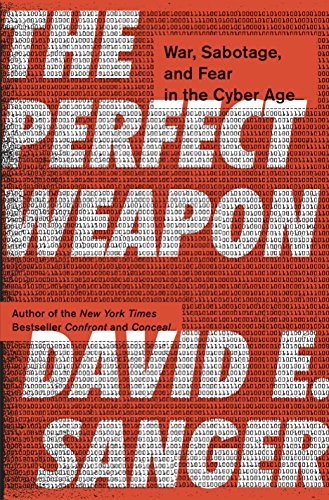
Russia and China have penetrated so deeply into the electronic systems that sustain the American economy that either country might be able to set us back two or three decades using cyber weapons. North Korea and Iran appear to be not far behind. What seems to be stopping them all is the equal or greater ability of the United States to do the same or worse to them—not to mention the chance we might reduce their countries to cinders with nuclear weapons. That’s the message at the heart of David E. Sanger’s chilling new book, The Perfect Weapon. “Great power competition—not terrorism—is now the primary focus on US national security,” he writes. And that competition is increasingly playing out online.
Estimated reading time: 5 minutes
The US government has been slow on the uptake to acknowledge this threat. In 2007, the intelligence community’s annual worldwide threat assessment delivered to Congress did not even include cyber weapons on the list. At that point, both Russia and China had been building their cyber capabilities for years. Now, of course, attitudes have changed.
The Perfect Weapon: War, Sabotage, and Fear in the Cyber Age by David E. Sanger (2018) 354 pages ★★★★★
The United States Cyber Command, created in 2009, was upgraded only in 2018 into a Unified Combatant Command, one of ten in the US armed forces. Cyber Command is headquartered at Fort Meade, along with the National Security Agency, and is commanded by the agency’s director. Together, NSA and Cyber Command house both our country’s offensive and defensive cyber operations. Sanger explains that the two organizations work together uneasily. Their priorities are sometimes at cross-purposes.
Excessive caution about the threat of cyber weapons
David Sanger is extraordinarily well-connected in Washington. He has been writing on foreign policy, globalization, nuclear proliferation, and the presidency for more than thirty years for the New York Times. He has been the paper’s Chief Washington Correspondent since 2006. Throughout The Perfect Weapon, he cites one-on-one conversations with nearly all the major players in the drama he describes. And drama it is. This book details the bureaucratic turf wars, foot-dragging, incompetence, and excessive caution that has so often characterized America’s inadequate response to the threat posed by cyber weapons.
The dilemma Sanger describes is worrisome. “America’s offensive cyber prowess has so outpaced our defense that officials hesitate to strike back,” he writes. Although American companies and government are penetrated online thousands of times every day, the government has rarely spoken out to denounce those responsible. Partly, this is because it may take days, weeks, or even months to assemble definitive proof about who launched a given attack. But it’s also because officials in the CIA, NSA, Pentagon, and White House are unwilling for our adversaries to gain any insight into how we obtained the information. Even when we know perfectly well who’s responsible, they decline to speak out. Simply citing specific evidence could reveal the existence of American or Allied “implants” in their computer systems. Like many of the top former officials he interviewed, Sanger regards that reluctance to show our cards as an error.
“The US has only rarely activated cyber weapons”
Unless the government can accuse an adversary in public, it’s hampered from retaliating. The upshot is that the US has only rarely activated cyber weapons, so far as we know. (The most notable exceptions were the Stuxnet attack on Iran’s nuclear production facilities in 2010, carried out jointly with Israel, and the attack on North Korea’s launch systems that caused its missiles to explode or fall into the sea.) However, Russia has not hesitated to attack weaker nations, chiefly Ukraine and Estonia, as well as both the United States and Western Europe.
As Sanger points out, there are ways, however inadequate, that the United States might combat a nuclear attack. There is always a warning, even if it’s measured only in minutes. With cyber weapons, however, there is no warning. And “In almost every classified Pentagon scenario for how a future confrontation with Russia and China, even Iran and North Korea, might play out, the adversary’s first strike against the United States would include a cyber barrage aimed at civilians.” And the threat isn’t limited to those four hostile countries. “A decade ago,” Sanger notes, “there were three or four nations with effective cyber forces; now there are more than thirty.” Now we face the proliferation of cyber weapons, not just nuclear devices.
About the author
David E. Sanger has written two books on American foreign policy as well as The Perfect Weapon, his most recent work. He is the Chief Washington Correspondent for the New York Times.
Previously, I reviewed Sanger’s first book, Confront and Conceal: Obama’s Secret Wars and Surprising Use of American Power. You can find my review at The surprising emergence of Barack Obama’s secret wars. In that review, I noted that Sanger described how “the apparently anti-war candidate Obama quickly morphed in office into a resolute, hands-on Commander in Chief.” In The Perfect Weapon, the author seems to have become more critical, taking Obama to task for what he regards as an excess of caution on cyber weapons.
For related reading
For a somewhat different perspective on the broader subject of internet security, see Fancy Bear Goes Phishing: The Dark History of the Information Age, in Five Extraordinary Hacksby Scott J. Shapiro (An entertaining history of hackers and hacking).
I’ve also reviewed four other books on subjects related to cyber weapons and Internet security:
- Cyber War: The Next Threat to National Security and What to Do About It by Richard. A. Clarke and Robert K. Knake, reviewed at An authoritative insider’s take on the threat of cyber war;
- The Expats by Chris Pavone, reviewed at A truly suspenseful novel about cyber theft;
- Future Crimes: Everything Is Connected, Everyone Is Vulnerable and What We Can Do About It by Marc Goodman, reviewed at The harsh truth about cyber security; and
- Dark Territory: The Secret History of Cyber War by Fred Kaplan, reviewed at The secret history of cyber war.
Like to read books about politics and current affairs? Check out Top 10 nonfiction books about politics.
This is one of the books I’ve included in my post, Gaining a global perspective on the world around us.
And you can always find my most popular reviews, and the most recent ones, on the Home Page.

























